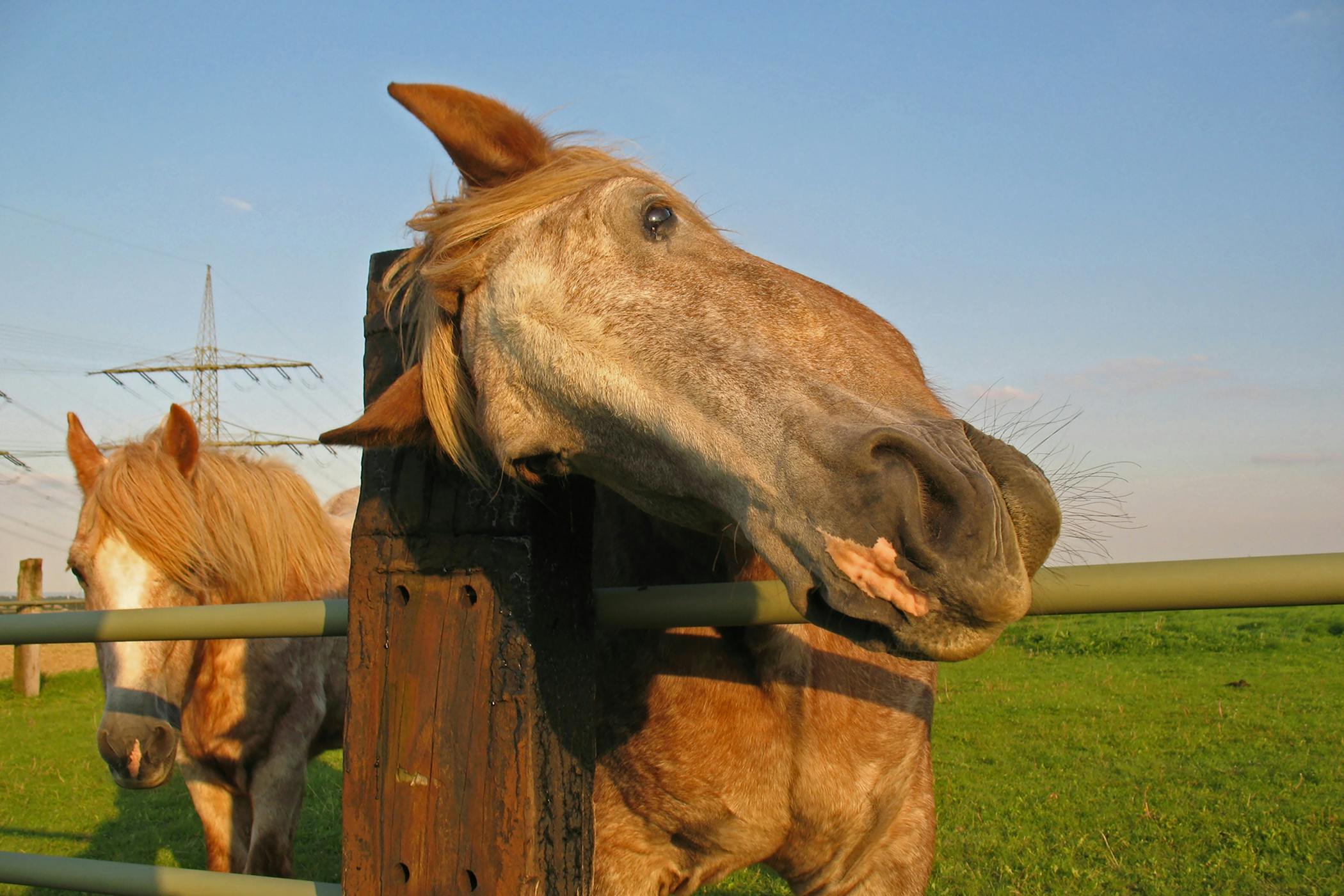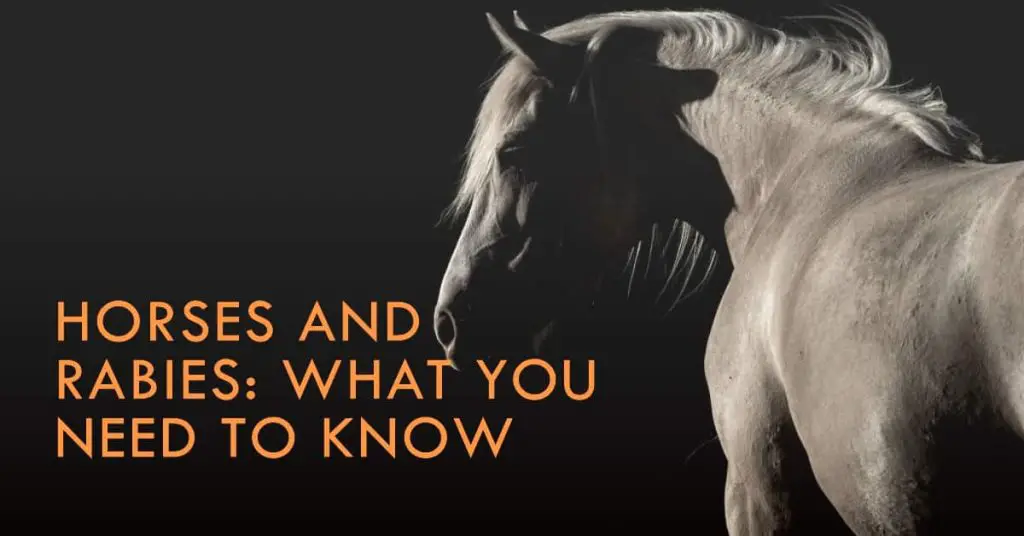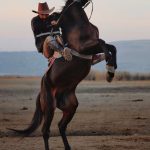Can a Horse Get Rabies? Yes, horses can get rabies. Rabies is an infectious disease caused by a virus that affects the central nervous system of mammals, including horses. Horses are susceptible to this virus and if left untreated, it can be fatal.
The most common route of infection in horses is through a bite from an infected animal such as a bat or raccoon. However, other forms of transmission exist.
Signs and symptoms include behaviour changes such as aggression toward humans and animals, depression, paralysis of limbs or facial muscles and difficulty swallowing.
Treatment includes administration of anti-rabies vaccine immediately after exposure, followed by a course of supportive treatment to reduce inflammation around the brain and aid recovery.
If your horse shows any signs associated with rabies infection seek veterinary help immediately for diagnosis and proper treatment plan.
Vaccination is the best way to protect against it, but it’s important to know the signs of rabies in order to diagnose and treat it early on.
Symptoms include changes in behaviour such as aggression, restlessness, depression or excitability, difficulty swallowing, and paralysis. If you suspect your horse has been exposed to rabies or is exhibiting any of these symptoms, contact your veterinarian immediately so they can provide proper diagnosis and treatment before the disease progresses too far.
How Common is Rabies in Horses
Rabies is relatively rare in horses, with only a few cases reported yearly in the United States. The risk of contracting rabies from a horse is low because most horses are vaccinated against the virus.
However, unvaccinated horses can still contract rabies if they come into contact with infected wildlife or other animals.
It’s important to take proper precautions when dealing with any animal carrying the disease, such as wearing protective gear and avoiding direct contact with their saliva or bodily fluids.

Credit: wagwalking.com
Managing Rabies Exposure in Horses
If you suspect your horse has been exposed to rabies, it’s crucial to take action right away. Immediately isolate the horse from other animals to prevent further spread. Call a veterinarian to examine the horse and administer post-exposure prophylaxis if needed.
This involves administering a rabies vaccine as soon as possible after exposure. The horse will also likely receive a dose of rabies immunoglobulin for immediate, short-term protection. Strict quarantine of the exposed horse is required for at least 6 months to monitor for signs of rabies development.
Understanding Rabies Vaccination Protocols
Horses require a complete primary rabies vaccination series followed by regular boosters. Foals can be vaccinated as early as 3-4 months old. After the initial vaccine series, horses need a booster 1 year after the primary series and then boosters every 1-3 years, depending on risk and vaccine type used.
It’s critical to follow your vet’s recommendations, as lapses in boosters leave horses vulnerable. Core equine rabies vaccines provide proven protection. But vaccination timing and adherence to protocols are key. Discuss an optimal schedule with your vet.
Raising Awareness to Prevent Rabies Spread
Rabies poses a significant public health threat. Horse owners must be vigilant in protecting their animals while also preventing disease spread. Know the signs of rabies, avoid exposing horses to wild animals when possible, and vaccinate on schedule.
Report any potential exposures or rabies deaths among local wildlife to raise community awareness. The more informed horse owners are, the better able they are to protect horses and prevent further spread. Collective action is key to controlling this deadly zoonotic disease.
What Happens If a Horse Gets Rabies?
If a horse gets rabies, it can be a very dangerous situation. Rabies is an infectious and fatal disease that affects the nervous system of mammals, including horses.
Symptoms in horses typically include changes in behaviour such as restlessness or agitation, excessive salivation, unusual aggression towards people or other animals, difficulty swallowing food or water and muscle spasms.
If left untreated, rabies can cause paralysis and eventually death. Treatment for rabies includes vaccination to prevent the spread of the virus and supportive care, such as antibiotics to treat any secondary infections that may occur.
It is important to recognize signs of possible infection early so treatment can begin quickly before irreversible damage occurs.
In addition, it is also important to take precautions when handling horses suspected of having been exposed to rabies, including wearing protective clothing such as gloves and long-sleeved shirts when working with them and disposing of dead animals properly according to local regulations.
How Would a Horse Get Rabies?
Rabies is a zoonotic disease, meaning it can be spread from animals to humans. It is caused by the rabies virus and can affect all warm-blooded mammals, including horses. The most common way for a horse to get rabies is by biting an infected animal, usually bats or skunks.
The virus enters the body through the wound and travels along nerve pathways to the brain, where it eventually causes paralysis and death if left untreated.
Horses may also contract rabies indirectly when they eat food or water contaminated with saliva from an infected animal or person. In some cases, horses may even become infected after being exposed to sick livestock, such as sheep or pigs, who have contracted rabies through contact with rabid wildlife species like foxes or raccoons.
Vaccination against rabies is highly recommended for horses in areas where there are known outbreaks of this deadly disease, as well as any horse that spends time outside in wooded areas where wild animals roam freely.
What Does Rabies Look Like in a Horse?
Rabies is a serious virus that affects horses, as well as other animals. It can be fatal if left untreated, so it’s important to recognize the signs of rabies in horses early on.
In horses, the disease usually starts with behavioural changes such as restlessness and aggression.
As the virus progresses, clinical signs such as fever, anorexia and depression may develop along with paralysis of the throat or tongue muscles, making it difficult for them to swallow or eat.
In some cases, there is also hypersensitivity to light and sound, which leads to head tossing or tail switching when exposed to either one. Seizures are often seen at late stages of infection due to brain inflammation caused by the virus.
If you suspect your horse has been infected with rabies, contact a veterinarian immediately for testing and treatment options.
Do Horses Need Rabies Shots?
Horses need rabies shots just as much as other animals. Rabies is a deadly virus that affects all mammals, including horses, and there is no cure for it. Vaccination against this disease can be done in two stages: pre-exposure and post-exposure.
Pre-exposure vaccination consists of three doses administered over one year; the first dose should be given to the horse at least four weeks before potential exposure to rabies. So that immunity develops prior to any risk. Post-exposure vaccination involves two doses on days 0 and 3 after a suspected or confirmed bite from an animal known or suspected of rabies.
The vaccine used must contain an adjuvant approved by your veterinarian in order for it to provide maximum protection against this fatal virus in horses.
Regardless of which method you choose, vaccinating your horse against rabies will help protect them from contracting this serious illness while reducing the spread of this dangerous virus throughout their community – both human and animal alike!
Rabies in a horse (furious form)/dog bite history/salivation/excitation/hypersensitivity
Conclusion
In conclusion, it is possible for a horse to get rabies. While the chances of this happening are low, it is still important to protect your horse against rabies and other infectious diseases. Vaccinating your horse regularly and avoiding contact with wildlife are good ways to keep them safe from this potentially fatal disease.
If you have any questions or concerns about whether or not your horse may be at risk of getting rabies, speak with a veterinarian as soon as possible.
Janet G Kulick is an experienced horse rider, trainer, and owner of the informative horse blog, Horseray.com. Her engaging writing style and wealth of knowledge on horse care, riding, and training make her a trusted source for horse enthusiasts worldwide.






